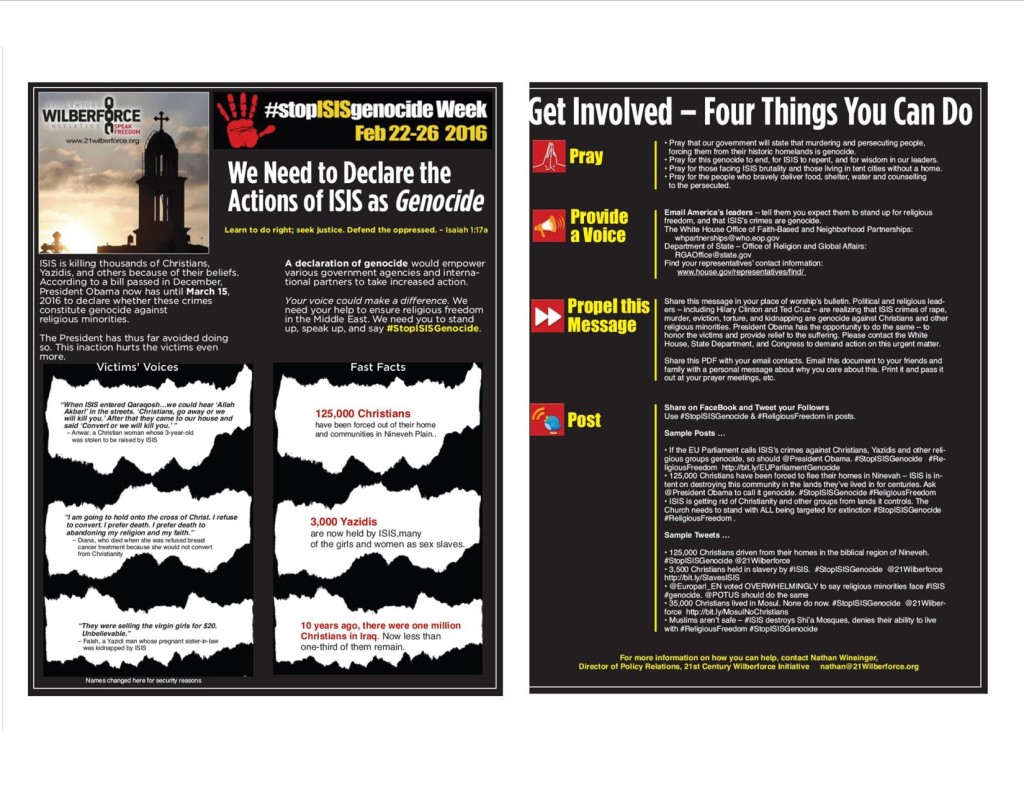(First published on the Faith & Chelsen: Tackling Tough Topics in Church and Culture blog on Patheos)
UPDATE! FEBRUARY 24 2016!
IRD is pleased to partner with our friends at the 21st Century Wilberforce Initiative on the #stopISISgenocide campaign that began this week. 21 Wilberforce has provided some resources to make being an advocate even easier. The campaign flyer, shown below, will be available as a PDF you can print and distribute on Thursday, February 24 – please continue on past the “genocide week” date of February 26. There will also be a sample letter that can be sent to your member of Congress. Both these items are also available at 21 Wilberforce’s website.
But as we have said before, here and here, this is an urgent matter. A bill signed into law on December 18 requires Secretary of State John Kerry to report to Congress within 90 days on whether the Islamic State has committed genocide against Yazidis, Christians and other religious minorities in Iraq and Syria. The deadline for his report is March 17.
As 21 Wilberforce says in their current campaign:
Your voice could be the proof the State Department needs to declare genocide. #stopISISgenocide

In my last blog post I talked about passivity/denial versus advocacy/action. The behavior of the German churches in WWII that sing hymns louder to drown out the cries of the Jews is being repeated today in the face of ISIS’ genocide by some American Christians. Watch the film “Sing a Little Louder” and share it with your friends, fellow church members, and pastors.
Now it is time to take action. And the actions suggested in this blog post should be taken as soon as possible, because time is running out — both existentially, for the Assyrian Christians and other religious minorities, but also in a more literal sense, as you will see below.
Wage Spiritual Warfare
First and foremost, the battle against ISIS is spiritual warfare. If the Enemy ever used any proxies for his mission to “kill, steal, and destroy,” it is the Islamic State. Though some remain in denial about the evil we face, and pray just “for peace,” the Biblical mandate for Christians (not governments, not militaries ) is to battle — not against flesh and blood — “but against principalities, against powers, against the rulers of the darkness of this world, against spiritual wickedness in high places.” (Eph 6: 12)
In my day job as the Religious Liberty Program Director at the Institute on Religion and Democracy, I launched a new initiative to encourage committed prayer and fasting against this evil. You can read more about it and access some resources for prayer, such as 5 lessons we can learn from St. Patrick about spiritual warfare, and praying the Psalms for the persecuted church, on the “This Day We Fight” page of IRD’s website.
3 Things You Can Do
In addition to praying, there are, of course, many things you can do to support the Iraqi and Syrian Christians and others that do not involve supporting congressional resolutions. If you are too scrupulous to be involved in a political issue, by all means, stay on your knees and pray for the rest of us. Or support the numerous organizationsthat are helping the refugees on the ground in Iraqi Kurdistan, Jordan, Turkey, and elsewhere. But if you also believe in the value of making a moral stand as a country, to defend the weak and powerless and to clearly identify evil — things for which our country used to be known — read on.
As I said in my previous post and alluded to above, time is of the essence. The Omnibus bill signed by President Obama on December 18, 2015 contained a provision requiring Secretary Kerry to provide an evaluation to Congress of “the persecution of, including attacks against, Christians and people of other religions in the Middle East” and determine whether such attacks constitute genocide. That report is required within 90 days from the bill’s passage, in other words, March 17, 2016. It would put far greater pressure on the Administration’s determination if Congress passes a resolution declaring genocide before this deadline.
(CONTINUED HERE)
No comments yet




